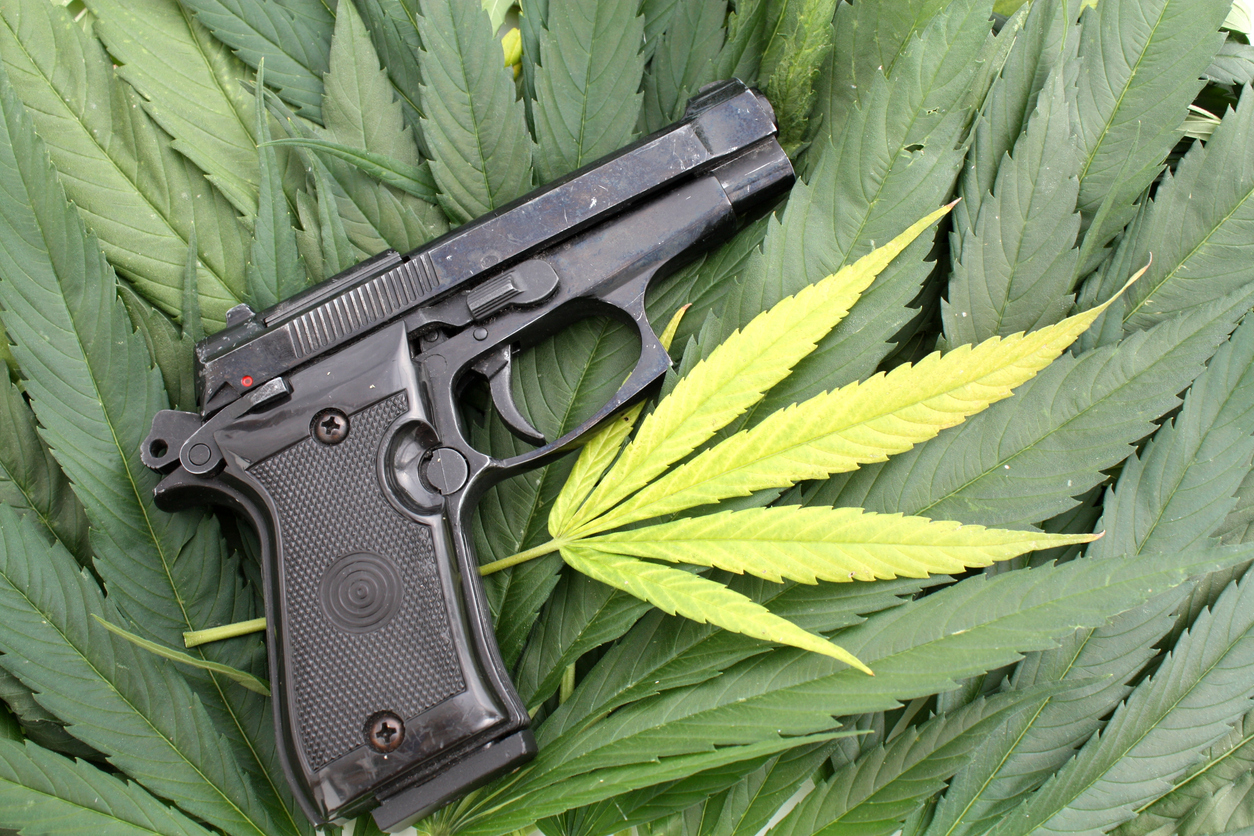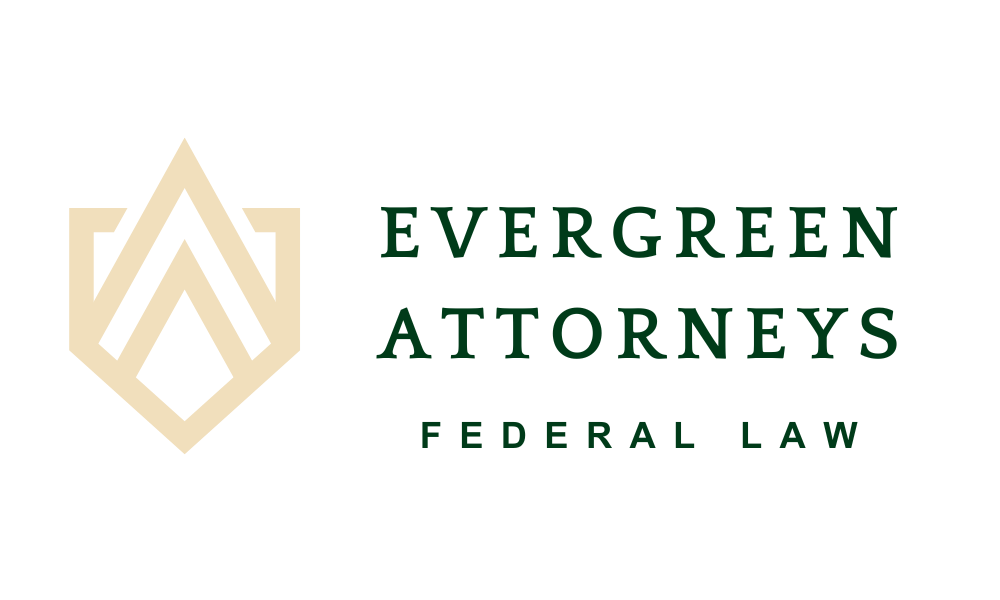Share
Share

Plano meeting location – by appointment only: We do NOT accept mail or service at this location.
5465 Legacy Drive Suite 650, Plano, Texas 75024
The Dallas appeals lawyers at Evergreen Attorneys are on the forefront of an important issue currently pending before the United States Supreme Court: Can a person own a firearm if they use marijuana?
At least one third of Americans own some sort of firearm, and nearly half of U.S. states have decriminalized or legalized marijuana use. What most people do not know is that under federal law, it is a felony to be a “user” or “addict” of a controlled substance (including marijuana) and own or possess a firearm.
Various states have enacted laws decriminalizing marijuana dating back to the 1970s. Medical marijuana began passing in states in the mid-1990s, and the legalization of recreational cannabis started in 2012. So why now are we questioning whether marijuana users have a Second Amendment right to possess firearms?
The answer is there are several cases pending before the United States Supreme Court now where the Solicitor General is arguing that any person who uses a controlled substance–including marijuana–is in violation of 18 U.S.C. § 922(g)(3). These cases have started to pick up national attention with Law360, Newsweek, and USA Today reporting on the issue.
922(g)(3) – A Federal Felony Punishable by up to 15 years in prison
Ever since the Supreme Court’s decision in Bruen in 2021, various challenges have been brought to federal firearm laws on the grounds that the Nation’s history and tradition do not support the Second Amendment regulation.
Under 18 U.S.C. § 922(g)(3), an individual is prohibited from possessing a firearm if they are “an unlawful user of or addicted to any controlled substance[.]” You have likely heard of schedule I, II, III, IV, or V controlled substances. For example, schedule I controlled substances under federal law have “no currently accepted medical use and a high potential for abuse” and include heroin, LSD, ecstasy and yes, marijuana.
An ”addict” for 922(g)(3) purposes is defined as “any individual who habitually uses any narcotic drug so as to endanger the public morals, health, safety, or welfare, or who is so far addicted to the use of narcotic drugs as to have lost the power of self-control with reference to his addiction.” 21 U.S.C. § 802(1).
But what defines a “user” under § 922(g)(3)? That may very well be the big question for the Supreme Court in the upcoming cases. The Code of Federal Regulation defines an “Unlawful user of or addicted to any controlled substance” as:
A person who uses a controlled substance and has lost the power of self-control with reference to the use of controlled substance; and any person who is a current user of a controlled substance in a manner other than as prescribed by a licensed physician. Such use is not limited to the use of drugs on a particular day, or within a matter of days or weeks before, but rather that the unlawful use has occurred recently enough to indicate that the individual is actively engaged in such conduct. A person may be an unlawful current user of a controlled substance even though the substance is not being used at the precise time the person seeks to acquire a firearm or receives or possesses a firearm. An inference of current use may be drawn from evidence of a recent use or possession of a controlled substance or a pattern of use or possession that reasonably covers the present time, e.g., a conviction for use or possession of a controlled substance within the past year; multiple arrests for such offenses within the past 5 years if the most recent arrest occurred within the past year; or persons found through a drug test to use a controlled substance unlawfully, provided that the test was administered within the past year. For a current or former member of the Armed Forces, an inference of current use may be drawn from recent disciplinary or other administrative action based on confirmed drug use, e.g., court-martial conviction, nonjudicial punishment, or an administrative discharge based on drug use or drug rehabilitation failure.
42 C.F.R. § 478.11.
Under this definition, a person who has a single positive drug test in the past year is prohibited from possessing a firearm under § 922(g)(3). Moreover, individuals who regularly use marijuana in states where it is medically or recreationally legal clearly fall under this definition of “user.”
State versus Federal Supremacy
24 states and two territories have legalized marijuana either medically or recreationally. However, marijuana remains a schedule I controlled substance under federal law. So does a person who legally uses marijuana under state law violate federal law if they own a gun? Yes, according to the Solicitor General.
This is because under the U.S. Constitution, when federal law conflicts with state law federal law will always win. This is known as the Supremacy Clause.
The Real Question: Does the Nation’s History and Tradition Support 922(g)(3)’s Second Amendment Ban?
Under Bruen, the Supreme Court held that for a regulation on the Second Amendment to be constitutional, the government must prove that the Nation has a history and tradition of such regulation. This has been a hard sell for the government given many drugs were not regulated until well after the founding, and § 922 was not implemented until the Gun Control Act of 1968.
In United States v. Connelly, the Fifth Circuit Court of Appeals held that historical precedence does not support disarming a sober citizen based solely on past use of a controlled substance. The Solicitor General is now seeking to overturn that decision in United States v. Hemani, and other cases in the Fifth and Eighth Circuit.
In another case out of the Eleventh Circuit, Florida residents that used medical marijuana sought a ruling that applying the law to them would violate their Second Amendment rights in Florida Commissioner of Agriculture v. Bondi. There, the government argued that the Nation’s history and tradition supported disarming felons, the mentally ill, drug addicts, and alcoholics.
The Eleventh Circuit flatly rejected each of the government’s proposed historical analogues finding them less burdensome than the restrictions placed on modern Americans under § 922(g)(3).
Dallas Appellate Lawyers Response to the Government’s Petition
Dallas appeals lawyers Zachary Newland and David Boyer have filed a response to the Government’s petition seeking to overturn Fifth Circuit case law. You can read the full responsive brief here. We are including a summary of key points below.
1. The Fifth Circuit’s Decision Was the Correct One.
The government argues that the Fifth Circuit erred in holding that the government must show active intoxication to convict under § 922(g)(3). We disagree. The Fifth Circuit faithfully applied the standards set by the Supreme Court in Bruen and Rahimi by comparing the government’s proffered historical laws to the Second Amendment restrictions of section 922(g)(3). The Fifth Circuit concluded that none of the government’s historical laws supported a finding that the government could prohibit a person from possessing a firearm when they were not actively intoxicated. According to the Fifth Circuit:
There are no clear sets of positive-law statutes concerning mental illness and firearms from the Founding.
. . .
Just as there is no historical justification for disarming citizens of sound mind, there is no historical justification for disarming a sober citizen not presently under an impairing influence.
2. Common Sense
Common sense is all that is needed to show why the government’s argument is untenable. Marijuana remains a schedule I controlled substance under federal law. Yet, 24 states, two territories, and the District of Columbia have legalized marijuana for adult recreational use. According to the CDC, approximately 52.5 million people, or about 19 percent of Americans, have used marijuana. At the same time, about 32 percent of Americans own at least one firearm. While the number of Americans who use marijuana legally under state law and possess a firearm is unknown, there is surely a significant overlap between the two.
Under the government’s theory, those people who legally use marijuana under state law and possess a firearm are in violation of 18 U.S.C. § 922(g)(3) and could be charged and sentenced to a term of imprisonment up to 15 years. This would mean that millions of Americans are currently violating federal law and could be prosecuted as such.
The Fifth Circuit squarely addressed this common sense component. Finding historic intoxication laws prevented intoxicated individuals from carrying firearms, the Fifth Circuit concluded that 922(g)(3) goes much further by prohibiting all possession for an undefined set of users even when they are not intoxicated.
3. 922(g)(3) Lacks Due Process
The Fifth Circuit correctly discussed the temporal and practical problem inherent in defining a “user” of controlled substances. The government is now arguing that the Second Amendment restrictions last only as long as the drug use continues. However, nothing in the statute supports the government’s assertion. In fact, it flatly contradicts it.
More concerning is the government’s position that 922(g)(3) somehow creates greater due process than other statutes. This is simply an incorrect definition of due process. The Supreme Court found other subsections of 922(g) constitutional under historical precursors that required a judge to find that the individual represented a danger to the safety of others before they could be disarmed. Section 922(g)(3) is unlike other subsections restricting firearm possession because it requires no prior fact-finding by a judge before imposing a blanket prohibition on an individual’s Second Amendment rights.
4. Restoration of Rights under 18 U.S.C. § 925(c)
In an apparent “Hail Mary” argument, the government argues that individuals who are banned from possessing firearms under § 922(g)(3) can seek restoration of their Second Amendment rights under 18 U.S.C. § 925(c).
Oddly, the government makes this argument while conceding at the same time that § 925(c) has been defunct from 1992 until 2025. Even if the statute is now operative, it wholly ignores the common sense application that any person who possesses a firearm and uses marijuana commits a federal crime under § 922(g)(3).
What Happens Next?
Right now, several cases are pending in the Supreme Court but none have been granted review. We will know this fall whether the Supreme Court will decide to hear these cases or not. If the Supreme Court votes to grant certiorari, then the government will have to prove that the courts of appeals erred in holding that no historical laws are on par with the broadly restrictive text of 922(g)(3). This holding has the potential to affect millions of Americans who use marijuana, whether legally or not, and have a firearm in their possession.
Contact Evergreen Attorneys Today
If you have been charged with a federal firearm felony or other federal offense, contact the lawyers at Evergreen Attorneys today for a free consultation. We are at the forefront of the fight for constitutional rights and have the knowledge and experience to fight your case. We can be reached out (303) 948-1489 or by email at [email protected].
David Boyer
It was David’s passion for the law and helping others that led him to becoming an attorney. He particularly enjoys appellate and post-conviction work.
David is proud to offer representation nationwide from his office in Plano, Texas.
STAY IN THE LOOP
Subscribe to our free newsletter.
Colorado Healthcare Fraud Investigations Colorado [...]
The OIG’s Audit of the [...]





